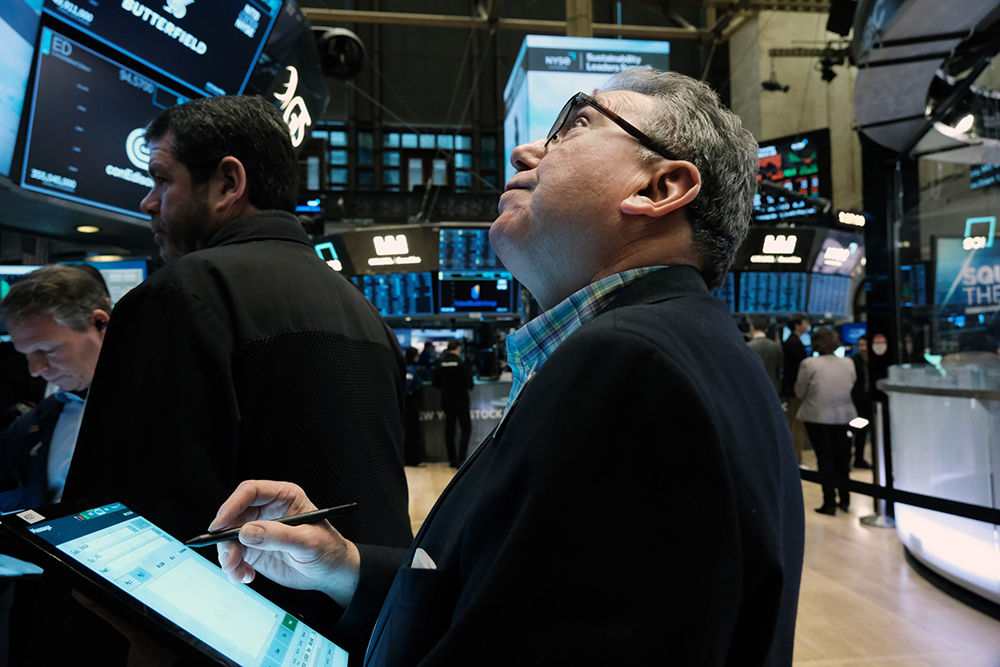
2005年,在次贷危机引发大萧条、导致数百万美国人失去住房的几年前,拉里·麦克唐纳(Larry McDonald)还是臭名昭著、现已倒闭的全球金融服务公司雷曼兄弟(Lehman Brothers)的副总裁。作为一名年轻的交易员,他和许多同行警告说,当年房地产市场出现了问题。多年后,他在《纽约时报》2009年的一篇文章中解释说,房地产市场陷入“寅吃卯粮的窘境中”,而雷曼兄弟则“直接冲向了有史以来最大的次贷冰山”。
但麦克唐纳的雇主无视他的警告,在2008年房地产泡沫破裂后,拥有158年历史的雷曼兄弟最终破产。在2009年3月结束的长达17个月的熊市中,标准普尔500指数暴跌约50%。
如今,拥有广泛读者的投资通讯《熊市陷阱报告》(The Bear Traps Report)的编辑和创始人麦克唐纳警告称,另一场股市崩盘即将来临。他说,他在次贷危机后开发的“雷曼系统性风险指标”——包括企业违约率、股票市场放空比率和投资者情绪调查——都发出警告信号。
他周二对美国全国广播公司财经频道(CNBC)表示:“我们的21项雷曼系统性风险指标显示,未来60天内崩盘或大幅下跌的概率最高,发生概率是自新冠肺炎疫情以来最高的。”他指的是2020年3月新冠肺炎疫情引发股市下跌。
麦克唐纳认为,在硅谷银行(Silicon Valley Bank))和签名银行(Signature Bank)倒闭以及瑞士贷款机构瑞士信贷(Credit Suisse)意外倒闭之后,投资者忽视了“滚动信贷危机”的风险,却过度关注人工智能和机器人等新技术的崛起。
他警告说:“我们以前在雷曼事件看到过这种情况,后来发生的情况是,冲击来了,信贷市场开始对风险进行定价,但股市却没有。他们关注的是像人工智能或是上世纪90年代的互联网革命之类的东西。”这表明他认为投资者在2001年互联网泡沫破裂导致股市暴跌之前犯了各种各样的错误。
麦克唐纳指出,即使在联邦存款保险公司(FDIC)本月介入拯救硅谷银行和签名银行未投保和已投保储户之后,美国各银行仍坐拥数千亿美元未变现亏损。抵押贷款支持证券和美国国债是许多银行持有的主要资产,在美联储去年大举加息后,这些证券的价值大幅缩水。这些损失已导致一些银行严重不稳定,迫使许多同行收紧贷款标准,并为潜在的银行挤兑做准备。
麦克唐纳说,由于放贷放缓,银行业的问题现在开始蔓延到商业房地产市场。他担心,随着美联储继续加息以抗击通胀,这些问题可能会影响经济领域的其他部门。
麦克唐纳说,好消息是,这不是“雷曼事件”,不会导致毁灭性经济衰退,“这只是一场缓慢滚动的信贷危机,因为美联储正在幕后抗击这场危机。”但他警告说,这并不意味着股市是安全的——股市即将大幅下跌。(财富中文网)
译者:中慧言-王芳
2005年,在次贷危机引发大萧条、导致数百万美国人失去住房的几年前,拉里·麦克唐纳(Larry McDonald)还是臭名昭著、现已倒闭的全球金融服务公司雷曼兄弟(Lehman Brothers)的副总裁。作为一名年轻的交易员,他和许多同行警告说,当年房地产市场出现了问题。多年后,他在《纽约时报》2009年的一篇文章中解释说,房地产市场陷入“寅吃卯粮的窘境中”,而雷曼兄弟则“直接冲向了有史以来最大的次贷冰山”。
但麦克唐纳的雇主无视他的警告,在2008年房地产泡沫破裂后,拥有158年历史的雷曼兄弟最终破产。在2009年3月结束的长达17个月的熊市中,标准普尔500指数暴跌约50%。
如今,拥有广泛读者的投资通讯《熊市陷阱报告》(The Bear Traps Report)的编辑和创始人麦克唐纳警告称,另一场股市崩盘即将来临。他说,他在次贷危机后开发的“雷曼系统性风险指标”——包括企业违约率、股票市场放空比率和投资者情绪调查——都发出警告信号。
他周二对美国全国广播公司财经频道(CNBC)表示:“我们的21项雷曼系统性风险指标显示,未来60天内崩盘或大幅下跌的概率最高,发生概率是自新冠肺炎疫情以来最高的。”他指的是2020年3月新冠肺炎疫情引发股市下跌。
麦克唐纳认为,在硅谷银行(Silicon Valley Bank))和签名银行(Signature Bank)倒闭以及瑞士贷款机构瑞士信贷(Credit Suisse)意外倒闭之后,投资者忽视了“滚动信贷危机”的风险,却过度关注人工智能和机器人等新技术的崛起。
他警告说:“我们以前在雷曼事件看到过这种情况,后来发生的情况是,冲击来了,信贷市场开始对风险进行定价,但股市却没有。他们关注的是像人工智能或是上世纪90年代的互联网革命之类的东西。”这表明他认为投资者在2001年互联网泡沫破裂导致股市暴跌之前犯了各种各样的错误。
麦克唐纳指出,即使在联邦存款保险公司(FDIC)本月介入拯救硅谷银行和签名银行未投保和已投保储户之后,美国各银行仍坐拥数千亿美元未变现亏损。抵押贷款支持证券和美国国债是许多银行持有的主要资产,在美联储去年大举加息后,这些证券的价值大幅缩水。这些损失已导致一些银行严重不稳定,迫使许多同行收紧贷款标准,并为潜在的银行挤兑做准备。
麦克唐纳说,由于放贷放缓,银行业的问题现在开始蔓延到商业房地产市场。他担心,随着美联储继续加息以抗击通胀,这些问题可能会影响经济领域的其他部门。
麦克唐纳说,好消息是,这不是“雷曼事件”,不会导致毁灭性经济衰退,“这只是一场缓慢滚动的信贷危机,因为美联储正在幕后抗击这场危机。”但他警告说,这并不意味着股市是安全的——股市即将大幅下跌。(财富中文网)
译者:中慧言-王芳
In 2005, years before the subprime mortgage crisis kicked off the Great Recession and led millions of Americans to lose their homes, Larry McDonald was a vice president at the infamous now-defunct global financial services firm Lehman Brothers. As a young trader he, along with many of his peers, warned that something was wrong in the real estate market that year. It “was living on borrowed time,” he would explain years later in a 2009 New York Times article, and Lehman Brothers “was headed directly for the biggest subprime iceberg ever seen.”
"But McDonald’s bosses ignored his warnings, and the 158-year-old institution that was Lehman eventually went under in 2008 after the housing bubble cracked. The S&P 500 would go on to lose roughly 50% of its value in the 17-month bear market that ended in March 2009.
Now, McDonald, the editor and founder of the widely read investing newsletter The Bear Traps Report, is warning that another stock market crash is on the way. He says the “Lehman systemic risk indicators” that he developed after the subprime mortgage crisis—which include things like the corporate default rate, stock market short-interest ratios, and investor sentiment surveys—are all flashing warning signs.
“[O]ur 21 Lehman systemic risk indicators are pointing at the highest probability of a crash or a sharp drawdown in the next 60 days—the highest probability since COVID,” he told CNBC Tuesday, referencing the COVID-induced market drop of March 2020.
McDonald believes investors are ignoring the risk of a “rolling credit crisis” after the failure of Silicon Valley Bank and Signature Bank as well as the unexpected demise of the Swiss lender Credit Suisse, and focusing too much on the rise of new technologies like artificial intelligence and robotics.
“We saw this before with Lehman, what happens is a shock comes in, credit markets start pricing the risk, but equities don’t. They focus on things like A.I. or things like the dotcom revolution in the ’90s,” he warned, giving a nod to the errors investors made before the dotcom bubble’s blowup sent stocks tumbling in 2001.
McDonald noted that even after the Federal Deposit Insurance Corporation (FDIC) stepped in to save both uninsured and insured depositors at SVB and Signature Bank this month, U.S. banks are still sitting on hundreds of billions of dollars in unrealized losses. The mortgage-backed securities and U.S. Treasuries that make up a majority of many banks’ holdings have seen their value slashed after a series of aggressive Federal Reserve interest rate hikes this past year. These losses have led to significant instability at some banks, forcing many of their peers to tighten lending standards and prepare for potential bank runs.
McDonald said banks’ issues are beginning to spread to the commercial real estate market now as a result of the lending slowdown, and he worries they could infect other sectors of the economy as the Fed raises rates to fight inflation.
The good news is this is “not a Lehman event” that will cause a devastating recession, “it’s just a rolling, slow-moving credit crisis, because the Fed is fighting it behind the scenes,” McDonald said. But that doesn’t mean stocks are safe—a sharp drawdown is on its way, he warned.






